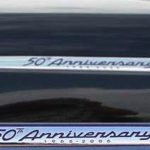Is the 2002-2005 Ford Thunderbird a future classic?
Much has been written about the 11th generation Ford Thunderbird, which was offered only for the 2002-2005 model years. The first two-seat Thunderbird convertible offered since the classic 1957 T-Bird, total production for all four years was limited to 68,095 units … very low by modern car and truck production standards. Take for instance the 2005 Ford Mustang production; nearly 200,000 cars for that model year alone.
With an original MSRP of $ 39,000 or more depending on options, the 2002 Thunderbird was considered rather expensive when first introduced. Strong demand and limited supply resulted in dealer mark-ups of $ 5,000, $ 10,000 or more. The ‘Retrobird,’ as it is sometimes called, is now 10-13 years old and prices have dropped to as low as the $ 12,000 range for higher-mileage examples. Very low mileage ’02-’05 Thunderbirds however, have brought $ 40,000 or more at collector car auctions, close the the original selling price when brand-new.
What does the future hold for this already collectible car? Some predict that values could reach six figures within the next 10 years. Others think values will continue to drop as these cars age. Here’s one automotive writer’s assessment: http://www.tflcar.com/2011/12/modern-collectibles-2002-2005-ford-thunderbird/
Based on my conversations with thousands of Thunderbird owners over the past twelve years, 90% or more plan to keep theirs forever, with no plans to sell. Most of the four-year production run have lower than average mileage and are very well cared for.
If history is any indication, the 2002-2005 Thunderbird is destined for much higher market values. 1955-1957 Thunderbirds bring many times their original price of around $ 3,500, with some examples selling for $ 80,000-100,000 or more. Aftermarket companies now provide reproductions and replacements for virtually every component of the 1955-57 T-Bird, including complete bodies, interior trim and mechanical and electrical parts. Can the 2002-2005 Thunderbird be far behind? Only time will tell.





